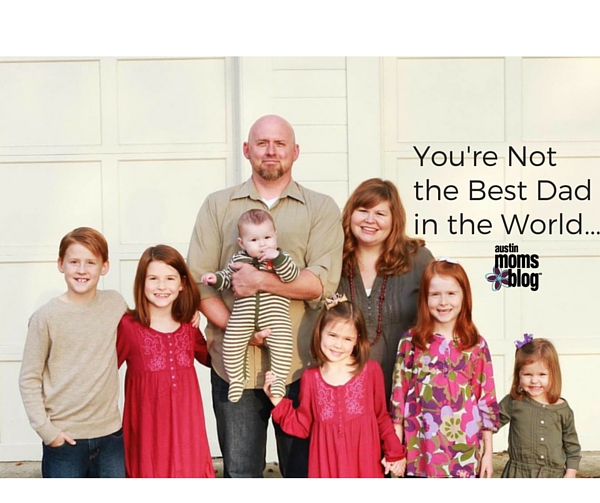
Many of us approach life’s challenges with a ‘fight or flight’ mentality. We tend to ‘buckle down’, and fight for what we want to accomplish, or we throw up our hands and walk away. It’s either perfection, or nothing.
One of the greatest of life’s challenges is, without a doubt, parenthood. And fatherhood in particular poses its own set of unique challenges. Being a dad is fun, exciting, an honor, and always an adventure.
But it’s also hard. And unlike career, finances, golf scores, home projects, and video games, it’s almost impossible to gauge our success in fatherhood. How do we know if we’re doing a good job? Without a tool for measuring success, maintaining motivation can be arduous — and sometimes nearly impossible.
Where does being a good dad start?
It starts by saying, “Ok, I can’t be a perfect dad, but maybe I can be a pretty good one.” Now faithfulness becomes the goal, not perfection.
So I thought I’d ask some dads I respect for input on this subject. I asked several whose ages, personalities, and styles of parenthood vary.
These are 3 key takeaways:
Apologize to Your Children
For whatever reason parents are reticent to apologize to their children. I imagine it has to do with pride. I imagine that we want to be role models for our kids and somehow we think apologizing to them would undermine our ability to lead by example. But both of those reasons for NOT apologizing are ludicrous.
Listen, your kids aren’t stupid. They figure out around age 6 that you’re not perfect. Sure, you need to be a good role model. But do you know what a bad role model is? A bad role model is someone who never apologizes.
To be in a family in which the dad makes a mistake — perhaps he loses his temper. Maybe he forgets an important school event. He might even say something mean or harsh — is completely debilitating to a family. If the usual routine is for you to lose your temper and then ‘act like nothing happened’ long enough for everyone in the house to seemingly forget about it, your family is bleeding from the inside
Children must experience forgiveness and reconciliation in a family. They need to see dad own his issues and take responsibility. They need to see mom and dad apologize to each other. And dads, you need to lead the way. If you do this, the family with follow, and so will respect for you as a dad.
“Be Present” with Your Children
Have you ever been physically present, but in other ways are very far away? Psychologically, mentally, spiritually, emotionally, you can be totally detached, but still in the room. This is something I struggle with every week.
I hate when my kids say, “Did you just hear what I just said?” Look, I’ve got 6 kids and one on the way. Yes, it’s hard, especially after being at work. My commute and work schedule is a solid 12 hours a day. I know it’s hard to be focused, to turn off the siren songs of work, to turn off the worries of finances, to turn off the *%#$@ game. No one wants a dad who’s not listening — or a dad who’s there, but not really
There’s nothing that speaks to a child’s heart more than listening. Be present. Be in the moment.
At my four daughters’ final dance recital of the year their amazing dance director asked all parents to not use tablets, phones, or other video devices during the show. This was to combat the annoying sea of raised hands and electronic rectangles blocking the precious (and already limited) views of proud and anxious parents. But her message was more than respect for others — it was be in the moment. Enjoy your kids now. Take pictures, post on Instagram, whatever — but don’t let that steal your now.
Being present also means confronting hard issues. A good friend and mentor of mine recently made the decision to be present when his daughter was in need.
My friend’s teenage daughter has an interested suitor who asked if he could help her dog-sit at a house — a house in which they would be alone together. My friend said, “No way partner.” But do you know what this young man did anyway? He went to the house where my friend’s daughter was dog-sitting.
My friend caught wind of this and do you know what he did? He went to the house where his daughter was dog-sitting.
He showed up to find them on the front porch and looked into this young man’s eyes and said, “You’ve lost a lot of respect from me today.”
Did his daughter freak out? Was she and this boy embarrassed? I don’t know. I don’t care. And neither did my friend. I can tell you that my friend has (and has had for 17 years) the kind of relationship with his daughter that him ‘being present’ — in every way the phrase implies — when he needed to be, wasn’t strange or surprising for her. He’s spent time being the dad who is there for her, and she loves and respects him for it.
If you’re not present with your children the first thing you lose is joy (which is a whole ‘nother blog post). And joy is central to a good family life. In the midst of busy-ness we as men struggle to be fully present, and we can’t enjoy the blessing of our families if we’re not really there. Be there. Be present.
Be Equally Strong in Authority and Relationship
As fathers we typically find ourselves tipping the scales between authority and relationship. In other words we’re good at relationship, i.e., the “fun dad” or we’re good at authority, i.e., the “tough dad.”
Both are important, but when we get out of balance we hurt ourselves, and our families.
If we’re going to do both we need to pursue deep, tender, and open relationships with our kids. Of course that entails what I’ve already said — apologize, listen, and be present. It means being interested in their interests, spending time together, fixing something together, taking a walk, going to the playground, family trips. It means asking a lot of questions, teaching them a skill, and sharing what’s in
But as dads we also need to also be strong in loving authority. You’re the parent. It’s especially in the early years that loving authority is best established. Children want boundaries, and that’s why they press them. Why parents have usurped their authority in the formative years of their kids’ lives, I don’t know.
But a strong parent who is not authoritarian (using manipulation, coercion, force or arbitrary rules) but one who is authoritative (using kindness, firmness, reason, and consistency) will win a child’s respect — and a child’s heart.
A father who can be both authoritative and relational will be a guide for the heart of his child. He helps correct when children are young and can begin to step back from authority with his teen-aged children because they’ve been taught the direction they should go.
There are no perfect dads and there are no perfect children.
But pretty good dads will raise pretty good kids. Sure, they’ll make their own decisions, and there are no guarantees. But when we’re faithful to pursue being good dads with some time-tested principals, the goal of faithfulness and the absurdity of perfection come into clear sight.









